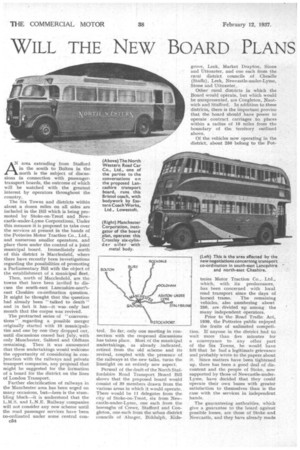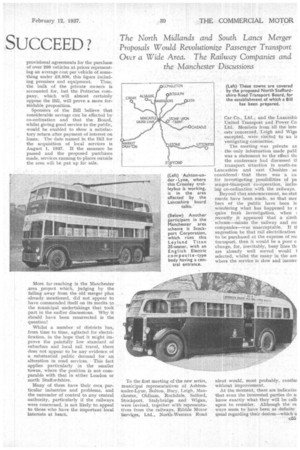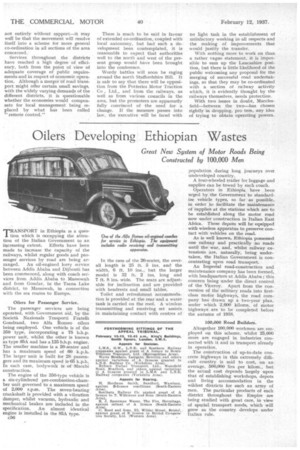WILL THE NEW BOARD PLANS SUCCEED?
Page 104

Page 105

Page 106

If you've noticed an error in this article please click here to report it so we can fix it.
The North Midlands and South Lanes Merger Proposals Would Revolutionize Passenger Transport Over a Wide Area. The Railway Companies and the Manchester Discussions
ANarea extending from Stafford in the south to Bolton in the north is the subject of discussions in connection with passengertransport boards, the outcome of which will be watched with the greatest interest by operators throughout the country.
The Six Towns and districts within about a dozen miles on all sides are included in the Bill which is being promoted by Stoke-on-Trent and Newcastle-under-Lyme Corporations. Under this measure it is proposed to take over the services at present in the hands of the Potteries Motor Traction Co., Ltd., and numerous smaller operators, and place them under the control of a joint municipal hoard. Immediately north of this district is Macclesfield, where there have recently been investigations regarding the possibilities of promoting a Parliamentary Bill with the object of the establishment of a municipal fleet.
Then, north of Macclesfield, are the towns that have been invited to discuss the south-east Lancashire-northeast Cheshire co-ordination question. It might be thought that the question had already been "talked to death " and in fact it has—it was only last month that the corpse was revived.
The protracted series of "conversations " .regarding a possible merger originally started with 10 municipalities and one by one they dropped out, until discussions ceased last July, with only Manchester, Salford and Oldham remaining. Then it was announced that these undertakings would welcome the opportunity of considering in conjunction with the railways and private transport companies, any proposal that might be suggested for the formation of a board for the district on the lines of London Transport.
Further electrification of railways in the Manchester area has been urged on many occasions, but—here is the stumbling block—it is understood that the L.M.S. and L.N.E. Railway companies will not consider any new scheme until the road passenger services have been co-ordinated under some central con c4 trol. So far, only one meeting in connection with the reopened discussions has taken place. Most of the municipal undertakings, as already indicated, retired from the old scheme and its revival, coupled with the presence of the railways at the new talks, turns the limelight on an entirely new aspect.
Perusal of the draft of the North Staffordshire Road Transport Board Bill shows that the proposed board would consist of 39 members drawn from the various areas in which it would operate. There would be 11 delegates from the city of Stoke-on-Trent, six from Newcastle-under-Lyme, one each from the boroughs of Crewe, Stafford and Congleton, one each from the urban district councils of Alsager, Biddulph, Kids grove, Leek, Market Drayton, Stone and Uttoxeter, and one each from the rural district councils of Cheadle (Staffs), Leek, Newcastle-under-Lyme, Stone and Uttoxeter.
Other rural districts in which the Board would operate, but which would be unrepresented, are Congleton, Nantwich and Stafford. In addition to these districts, there is the important proviso that the board should have power to operate contract carriages to, places within a radius of 10 miles from the boundary of the territory outlined above.
Of the vehicles now operating in the district, about 250 belong to the Pot teries Motor Traction Co., Ltd., which, with its predecessors, has been concerned with local road transport since the days of horsed trams. The remaining vehicles, also numbering about 250, are divided up among the many independent operators.
Prior to the Road Traffic Act, 1930, the Potteries public enjoyed the fruits of unlimited competition. If anyone in the district had to wait more than five minutes for a conveyance to any other part of the Six Towns, he would have felt that he had a legitimate grievance and probably wrote to the papers about it. Since matters have been tightened up, there has been a good deal of discontent and the people of Stoke, now supported by those of Newcastle-underLyme, have decided that they could operate their own buses with greater satisfaction to themselves than is the case with the services in independent hands.
The guaranteeing authorities, which give a guarantee to the board against possible losses, are those of Stoke and Newcastle, and they have already made
provisional agreements for the purchase of over 200 vehicles at prices representing an average cost per vehicle of something under £5,000, this figure includ
ing premises and equipment. Thus, the bulk of the private owners is accounted for, but the Potteries company, which will almost certainly oppose the Bill, will prove a more formidable proposition.
Sponsors of the Bill believe that considerable savings can be effected by co-ordination and that the Board, whilst giving good service to the public, would be enabled to show a satisfactory return after payment of interest on loans. The date named in the Bill for the acquisition of local services is August 1, 1937. If the measure be passed and the proposed purchases made, services running to places outside the area will be put up for sale.
More far-reaching is the Manchester area project which, judging by the falling away from the old merger plan already mentioned, did not appear to have commended itself on its merits to the municipal undertakings that took part in the earlier discussions. Why it should have been resurrected is the question!
Whilst a number of districts has, from time to time, agitated for electrification, in the hope that it might improve the painfully low standard of suburban and local rail travel, there does not appear to be any evidence of a substantial public demand for an alteration in road services. This fact applies particularly in the smaller towns, where the position is not comparable with that in either London or north Staffordshire.
Many of them have their own particular industries and problems,' and the surrender of control to any central authority, particularly if the railways were concerned, is not likely to appeal to those who have the important local interests at heart. To the first meeting of the new series, municipal representatives of Ashtonunder-Lyne, Bolton, Bury, Leigh, Manchester, Oldham, Rochdale, Salford, Stockport, Stalybridge and Wigan, were invited, together with representatives from the railways, Ribble Motor Services, Ltd., North-Western Road
Car Co., Ltd., and the Lancashir
United Transport and Power .Co Ltd, Members from all the inter ests 'concerned, -Leigh and Wiga excepted, were elected to an veStigating committee.
The meeting was private an the only information made publ was a statement to the effect thi the conference had discussed -0 transport situation in south-en Lancashire and east Cheshire .ar considered that there was a ca: for investigating. possibilities of pa senger-transport co-operation, inclue big co-ordination with the railways.
Beyond that announcement, no stat ments have been made, so that iner hers of the public have been le wondering what has happened to r quire fresh investigation, when recently it appeared that a simil; scheme—mints the railway and reca companies—was una,cceptabie. If ti suggestion be that rail electrification to be purchased at the expense of nx transport, then it would be a poor e: change, for, inevitably, busy lines th: are already well served would I selected, whilst the many in the are where the service is slow and i3aconv
nient would, most probably, contini without improvement.
At the moment, there are indicatio: that even the interested parties do n know exactly what they will be call+ upon to consider. Although the ra ways seem to have been as definite Usual regarding their desires—which 'a not entirely without support—it may well be that the movement will resolve itself into a scheme for more general co-ordination in all sections of the area concerned.
Services throughout the districts have reached a high degree of efficiency, both from the point of view of adequate coverage of public requirements.and in respect of economic operation. Although a merger of road transport might offer certain small savings, with the widely varying demands of the different districts, it is questionable whether the economies would compensate for local management being replaced by what has been called " remote control." There is much to be said in favour of extended co-ordination, coupled with local autonomy, but had such a development been contemplated, it is reasonable to expect that authorities well to the north and west of the present group would have been brought into the conference.
Wordy battles will soon be raging around the north Staffordshire Bill. It is safe to say that there will be opposition from the Potteries Motor Traction Co , Ltd., and from the railways, as well as from various councils in the area, but the promoters are apparently fully convinced of the need for a change. If the measure passes into law, the executive will be faced with no light task in the establishment of satisfactory working in all respects and the making of improvements that would justify the transfer.
With nothing more to work on than a rather vague statement, it is impossible to sum up the Lancashire position, but there is little likelihood of the public welcoming any proposal for the merging of successful road undertakings, so that they may be co-ordinated with a section of railway activity which, it is evidently thought by the railways themselves, needs protection.
With two issues in doubt, Macclesfield—between the two—has chosen rightly in dropping, pro tern, any idea of trying to obtain operating powers.




























































































































































